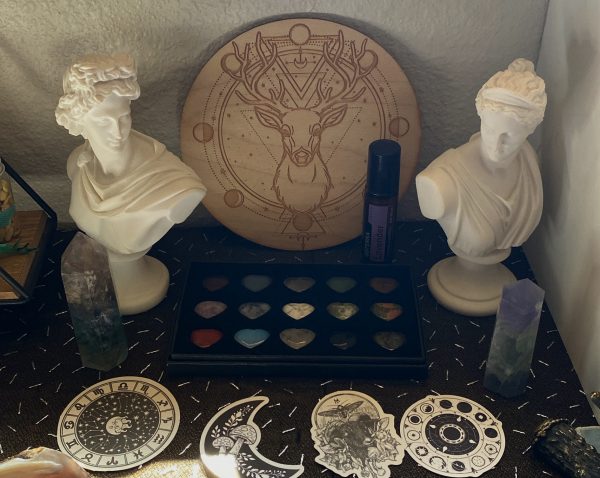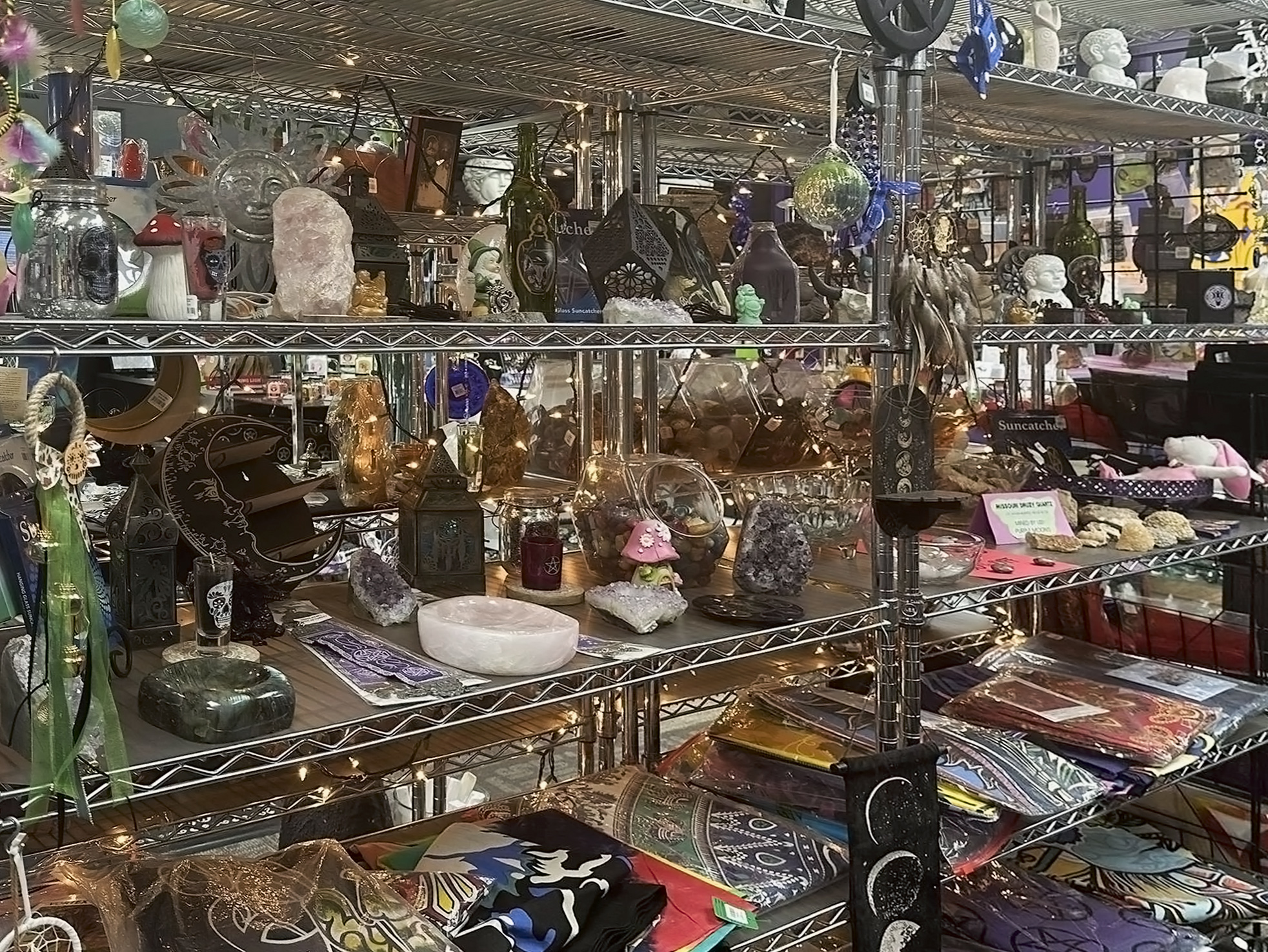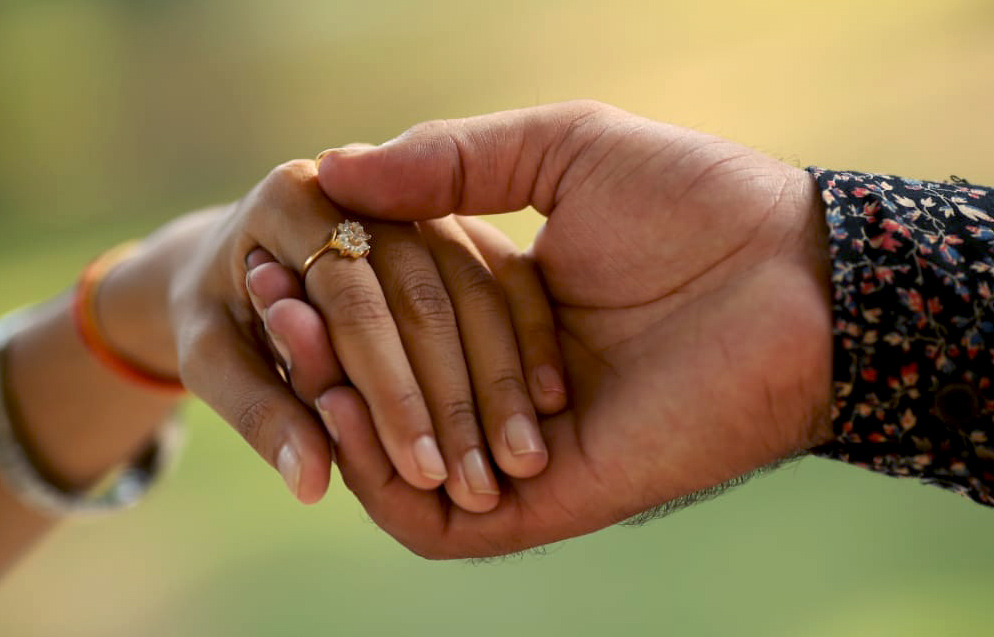Editor’s note: this article was updated to clarify the discussion of Artemis, Apollo and Hecate.
In movies, witches have green noses, black pointy hats and cauldrons. At Drake, however, they have glasses, headphones and laptops.
The three terms most often associated with modern-day witches are Witchcraft, Paganism and Wicca. Those who follow any one of the three may face stereotypes due to others’ preconceptions of the practice, especially being referred to as “devil worshippers.”
“That has been my favorite stereotype I’ve heard,” said Andi Turnbull, a senior at Drake who calls themself a witch. “And my answer is no, every single time. ‘[Do] you believe crystals can heal diseases?’ No, crystals can help concentration, focus, mental clarity or grounding you, [but] they’re not going to heal cancer. They’re not going to heal diabetes. I don’t believe that.”
According to Turnbull, there are differences between Witchcraft, Paganism and Wicca. Wiccans traditionally follow the God and Goddess and prioritize nature and connection. This branch of belief is noted to have begun in the 1950s.
Paganism refers to several different religions but tends to point towards non-Christian beliefs. The term first surfaced during the reign of the Roman Empire.
Modern Witchcraft refers to the combined practice of Wicca and Paganism.
“A lot of people confuse them, and there’s no shame in confusing them because a lot of people don’t know Wicca is its own religion,” Turnbull said. “I practice Witchcraft, but I believe in Paganism.”
Turnbull moved towards their spirituality more radically when the pandemic hit, but they always felt drawn to mysticism and Witchcraft.
“I’d always been a fan of spirituality in general,” Turnbull said. “I just kind of started drifting into spirituality more and more because I believed there was [a] higher power of some sort. Eventually, Witchcraft just seemed like the natural next step. And it’s been such a fun part of my life.”
Carol Horton is the owner of the metaphysical shop Purple Moon’s Magical Emporium, located on Merle Hay Rd. and Douglas Ave. She believes that, despite the differences between Witchcraft and monotheistic religions like Christianity or Islam, the core practices aren’t so different.
“We kind of go through the same thing,” Horton said. “We call them spells, they call them prayers. [We do] offerings [with] cakes and ale, they do wine and crackers. Man-made religion was kind of created off of [rituals]. Instead of calling them saints, we call them gods or goddesses, and [we] pull the one that actually attunes to what you’re working on.”
Turnbull enjoys that freedom of choice and will in their practice.
“There are higher powers that do kind of preside over different aspects of life, love, nature, the ocean, what have you, but we still have free will to ask them for help or kind of just let fate do whatever it wants,” Turnbull said.
Turnbull’s practice extends beyond the home. They carry their beliefs throughout the day-to-day via accessorizing.
“My jewelry is also a part of my practice. I pick up my jewelry very intentionally,” Turnbull said. “I have my wheel of fortune tarot card, obsidian, a rune and crystal pins on my iconic jacket. If nothing else, I’m at least wearing jewelry with intention, and that’s always important.”
Turnbull uses their jewelry to pay homage to their deities. Deity work is common in Witchcraft and Hellenism, the practice of Greek mythology and culture. Witches feel a call towards a certain deity and invoke them so they can learn lessons and receive blessings. Just as Christians aim to be Christ-like, witches aim to reflect their deities.

Hecate, the goddess of Witchcraft, the underworld, crossroads and the night, is often blamed for the stereotype that witches are devil worshippers. Due to her connection to the underworld, her name is frequently invoked during seances, demonic sacrifices and practices of dark magic in media. Hecate is one of the deities Turnbull works with. In Paganism and Wicca, she is regarded as the Triple Goddess.
“[Hecate is] a goddess of three faces,” Turnbull said. “She’s the Maiden, the Mother and the Crone, and she represents phases in life. Every time you’re kind of at a transition, you’re at a crossroads in life. She represents crossroads and doorways and paths. She shows the progression of life.”
Aside from Hecate, Turnbull also works with Artemis and Apollo. In Greek mythology, Artemis and Apollo are twins. Artemis is the goddess of maidens and femininity, often representing the moon. Apollo is the god of music and healing and is associated with the sun. Thanks to each connection with their deities, they have learned to appreciate their gender identity.
“Being [transgender], I’ve learned to love who I am physically through [Artemis],” Turnbull said. “It’s okay to be born female, but identify as male. You can still love your physical self even if you haven’t started transitioning. Apollo’s [helped me] love the masculine aspects of myself. They’ve very much been both sides of the same coin.”
While the Twins assist Turnbull with their gender identity, Hecate helps them with expression.
“Hecate is just a love of all things, kind of almost seeing the beauty in dark things,” Turnbull said. “Through her, [I’ve learned to] have confidence in how [I] express [myself]. That’s kind of something I’ve learned throughout my whole practice. [She’s taught me that] your life is in phases, and right now you’re in this current phase [but] it might change. It might stay the same. It might just evolve.”
While Drake doesn’t have a documented Witchcraft organization, Turnbull says they have found a community through Interfaith, an organization dedicated to including students from any religious background.
“Interfaith has always been really accepting as an organization,” Turnbull said. “A couple years ago, I had done a presentation about the Sabbats, or the holidays that I celebrate, and somebody else [from Interfaith] had done a presentation on their Sabbats and how they’re similar and different [to mine].”
Even though Turnbull faces stereotypes in their practice, they can always rely on their friendships for support.
“When you tell your friends you’re anything under [this] umbrella, it’s always fun to see their reactions,” Turnbull said. “My friend[s] adore the fact that I practice Witchcraft. They don’t believe in it because they’re from different religious backgrounds – they believe in it to a point. But, they’re so respectful.”
Even though their beliefs differ, Turnbull’s friends will often ask them questions about the practice of Witchcraft, wondering about their deities or the planets being in retrograde.
“It’s so fun having friends who accept it, even though it’s not their beliefs, because they’re always [asking] to be supportive,” Turnbull said.
Through their practices, Turnbull has also learned to trust their gut and intuition.
“I have mental health diagnoses that relate to anxiety, so I’m more often than not second-guessing myself,” they said. “Through reading Tarot, meditating or using my pendulums, I’ve learned to kind of trust myself a lot more and to put more faith into [my gut].”
Despite their years of practice, there is still much Turnbull doesn’t know.
“I don’t understand everything about certain things, and that’s okay,” they said. “I don’t have all 78 tarot cards memorized, I just know the broad meanings and can always look it up. There’s no shame in looking up information that you might have forgotten, and that was a big thing for me. You don’t have to know everything.”
Horton has noticed a wide variety of patrons in her store since opening, all coming from different levels of experience. She believes Witchcraft helps people find themselves and “their spot in the world” and tries to assist anyone she can.
“We try to help people as they come through with their different issues and ailments and such as well,” Horton said. “[This store’s goal is] really just to be positive for our community and hopefully raise awareness on different things that we do here.”
There’s always something new to learn, according to Horton.
“You can study your whole lifetime, and you’re never going to learn it all,” she said.
Horton also said that she encourages anyone who is unsure about pursuing Witchcraft to stop by her store.
“If you have any questions [or are] feeling down or have doubts in your life, come see us. Let us talk with you,” Horton said. “We’re both very skilled at what we do. I’ve been doing this for about 28 years. We’re not just here to be little witches, we’re here to help our community, so don’t be scared. Come ask, reach out. We’re all here for a positive outcome.”














